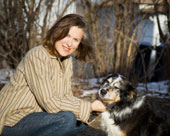 |
 |
 |
10/17/18 KAXE: MN Author Sarah Stonich's New Novel "Laurentian Divide" 9/25/2018 The Thread - Euan Kerr. Stonich's new novel revisits her North Country Minnesota roots.6/12/2017 WTIP North Shore Community Radio Sarah Stonich talks about her memoir of making her own place in the woods: "Shelter" November 2015 Ava Finch on KAXE/KBXE "Fishing with Rayanne" 11/3/2105 Write On! Radio We speak with Ava Finch, also known as Sarah Stonich, about her new novel Fishing with Rayanne.
5/7/13 Write On! Radio: We speak with Sarah Stonich about her new novel Vacationland. LISTEN 4/24/13 Real Good Words interview on KAXE with Heidi Holtan LISTEN 3/30/11 interview with Kerri Miller on MPR Midmorning LISTEN 3/22/11 Write On! Radio!interview with Ian Leask LISTEN 3/21/11 Interview with Euan Kerr
Interview on The Next Big Thing April 22, 13 What’s the structure for Vacationland? Interconnected stories that pivot on the same geographical point: a once-thriving fishing resort where multiple characters thread one chapter to another, and each to the main protagonist, Meg.
Which actors would you choose to play your characters in a movie rendition?
What is the one-sentence synopsis of your book? Painter Meg returns to what’s left of the family resort, where visitors and their memories still crowd the place, recalling their various vacations and connections to those who’ve tended the resort since 1939. How will you help promote this title? Social media, pursuing library events and alternative venues beyond what my publicist can do (she has more books to promote than mine) Holding my north-woods-themed book launch in a bar was one – I gathered local writers who all helped by reading parts of the book. We had a polka duo, book-jacket beer coasters and a Bad Plaid fashion show. So fun.
How long did it take you to write the first draft of your manuscript?
What other books would you compare this story to within your genre?
Who or what inspired you to write this book? The idea of a resort from varying perspectives of visitors, proprietors and locals seemed like a concept I felt worth weaving characters around. In Minnesota, a lot gets written about the wilderness experience, but less about resort life, and very little about the people and the communities that line the roads leading to such places – like the beer truck drivers and bait shop owners. I wanted to tell their stories. But I was also moved to challenge the tired Minnesota stereotype – not all the men in Vacationland are good looking and not all the children are above average – or white for that matter. What else about your book might interest readers? The themes of vacations - seems everyone has a memory, of a resort; and old cabin; scout camp, or maybe had some fishing or canoe trip go either very right or very wrong. Vacations can be awful or wonderful, even life-changing. For some, maybe those two weeks in July are just a yawn in time, a pause in life with enough leisure to take a real look around or even inward.
June 2005 Interview NPR, Aspen Q. The Ice Chorus follows a Canadian filmmaker working through her memories after she's escaped to a remote Irish village. You've mentioned sometimes not knowing the underlying goal or premise of a book is until it's written. What did you discover after writing the The Ice Chorus? A. I've heard other writers claim this - that we don't always know what we're on about until the end. In my case, I didn't know what besides the basic story compelled me to write The Ice Chorus until another writer pointed out what he thought the parallel was. He insisted the novel was about the importance of telling our own personal histories, if not to others, at least to ourselves. Q. And did Liselle discover that? A. She was so caught up in telling the stories of others it took her awhile, but in the end, she tells, reveals herself her own history, puts together the hidden and stowed memories in order to understand herself... to move into a future, to go into it with an awareness, and how even the denied bits of a past form who she is today. Q. The phrase "Irish Yarn" comes to mind when reading the passages about Remy Conner, the patriachal figure who takes Liselle under his wing. A. I think Remy facies himself a 'sanachie' of sorts - a dying breed of the Irish storyteller who once roamed the country giving history, or stories, for a bed and a meal, and drink, of course. Remy though, isn't itinerant. He does enlighten Liselle that there are many ways of telling a story, even suggesting that with her camera and her documenting of peoples lives, she might just become a modern version of a 'sanachie'. Q. The Irish settings and characters - especially their dialogues, are so vivid. What is your history with the locations and people you write about. A. Other than times spent in Ireland and reading tons of Irish literature? very little, actually. I'm not Irish, but during my visits I've always felt completely at home - with the people and the landscape - I love the cadence and the manner of the language - the average Irish person speaking an English so descriptive and colourful it's nealry a different tongue, and the articulate Irish person practically speaks in lyrics... Q What keeps drawing you back? A. Ah, besides the people and the sea? Something I cannot articulate well - but to simplify it at its most basic, the air on the West Coast seems to be the sort of air my lungs were meant to breathe, a mix of molecules that include both calm and inspiration. more coming...page under construction
March 2001 Interview These Granite Islands, Sarah Stonich’s debut novel, published by Little, Brown. Foreign rights have sold to seven countries, plus the United Kingdom, and the book is slated for translation into six languages. The publisher plans a staggering first printing of 75,000 copies. Stonich is now at work on a third novel, and a volume of short fiction. The recipient of a Loft/McKnight Award, and a Minnesota State Arts Board Fellowship, Stonich has traveled China to collaborate with a Chinese American painter on a book of essays and paintings. She has been awarded residencies at Ledig House International Writers Program, the Ragdale Foundation, and the Tyrone Guthrie Centre. She lives in St. Paul, with her son.
|
 |
||||